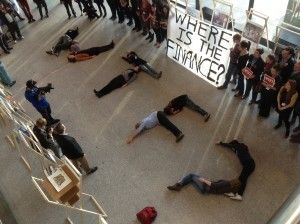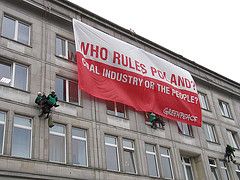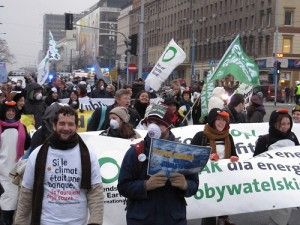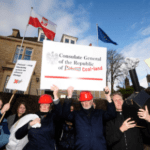
Sunday 24th November 2013
By Jo O’Neill, Policy Officer at SCIAF (a member of Stop Climate Chaos Scotland)
In the dying hours of the climate talks last night activists took to the seats of Warsaw’s football stadium to make some serious noise. Their message was that climate change is no game. Yet as the negotiations drew to a close, it’s clear that some are not taking this problem seriously; with those living in poverty losing out.
In the past week SCIAF and our catholic network of development agencies, CIDSE, have been speaking to delegates about the need for climate justice for the world’s most vulnerable people. Father D’Souza, SCIAF partner and Director of Caritas India said: “Climate change is happening now. For communities already living in poverty, farming and fishing is becoming much harder. Young people are struggling to find alternative livelihoods”.
Like others, one of our key demands was progress on climate finance. Earlier this week, in a rare moment of progress European countries pledged money to the Adaptation Fund to support developing nations adapt to the effects of climate change. But this money is a mere drop in the ocean when you consider the costs of adaptation and as we leave Warsaw developing countries still lack clarity on the promised $100bn per year by 2020.
Ambition has proved to be another major sticking point. At this COP, some countries in fact went backwards on their pledges and the roadmap to the 2015 global deal lacks the solid foundation it needs. Rather than making early pledges of post 2020 climate targets, countries have instead opted to set out their action at a later date.
Countries did, however, agree to establish a mechanism to address the loss and damage caused by climate change. This is an important step forward but – as ever – the devil is in the detail and NGOs are calling for that detail to be strengthened if the mechanism is to work for the most vulnerable.
For SCIAF, our priority now is the coming talks in Lima next year and in Paris in 2015. With others, we will be working to strengthen the social movements in Europe and beyond that are demanding action on climate change.
On Twitter today Yeb Sano, the Filipino representative to the talks, pledged to maintain his fasting action and CIDSE members will be following suit ahead of the COP in Lima. It is this spirit of solidarity that was lacking in Warsaw and one which the world desperately needs in the run-up to 2015.

Saturday 23rd November 2013
By Jo O’Neill, Policy Officer at SCIAF (a member of Stop Climate Chaos Scotland)
Here at the national football stadium in Warsaw, the COP has gone into extra time.
The negotiations – which were set to end yesterday – have been taking place throughout the night and as I write this, the discussions look no closer to reaching a conclusion. For those of us still in Warsaw, a long night looks set to become a rather long day.
Reflecting the mood of many developing nations, the Bangladesh representative said this morning: “Our expectations have been shattered, we are saddened”. The representative for the G77 and China added: “We are beginning to wonder really…the available outcome of the talks we are having.”
Unsurprisingly, one of the key sticking points of the talks is finance. While (in a rare bright moment of this COP) some cash was pledged to the Adaptation Fund during the week, G77 countries and the least developed countries are frustrated that there is still no roadmap for commitments between now and 2020 on the $100bn climate finance promise
The other major challenge here is agreeing on a pathway to the 2015 global climate deal in Paris, which would set out emissions cuts pledges before 2020 as well as milestones to 2015.
The debate on loss and damage also rumbles on, with talk of creating a ‘Warsaw mechanism on loss and damage’ for addressing the damage experienced as a result of climate change. Some developing countries are demanding much more ambition from the draft text that is currently being discussed.
As the talks went on last night activists took to the seats of the national stadium to voice their frustration. “Stop climate madness” was the chant. We can only hope that today delegates heed their call.
Thursday 21st November 2013
By Mary Church, Head of Campaigns at Friends of the Earth Scotland (a member of Stop Climate Chaos Scotland)
It’s been brewing since Copenhagen 2009, and today it finally happened. An estimated 800+ civil society observers – led by groups from the global south – walked out of the Warsaw climate talks in what was both an act of solidarity and an expression of disgust at the failure of leaders of the developed world to act on what the science is irrefutably telling us.
As the Philippines’ Environment Minister put it: “I am beginning to feel as though we are negotiating on who is going to live and who is going to die.” Two decades of negotiating, two more decades of polluting our planet. Enough is enough. Our t-shirts said: ‘Polluters talk, we walk’ … ’Volveremos’.
But if the villains of the piece (too many to name, but we could start with the hosts, Poland, plus Australia, Japan, Canada and corporate sponsors Shell, Emirates, Lotos et al) are rubbing their hands in glee at the thought of civil society-free negotiations, then they haven’t understood our message.
Volveremos: we will be back, stronger than ever. We walked out of the talks today, out of this meeting, not the ongoing process. Flawed as it may be, the UN climate talks, where in theory each country has an equal voice, is the best, most democratic place to decide on a course of action to tackle the most serious threat faced by humanity. South American groups know what it means for next year’s peoples’ pre-COP in Venezuela and COP-20 in Peru.
When we walked out we re-grouped in Nowy Zielony Świat (New Green World) a well known cultural centre and symbol of creative thinking, recently disused, but revived by the Polish Youth Climate Network to provide a space for civil society outside the talks, since the Polish Government didn’t see fit to.
We sat together in that space (having overloaded the makeshift internet hub with #COP19 #fail #volveremos) and what we saw was, not exactly the beginning, but a new beginning for a global movement to demand climate justice. The campaign is more united than it has ever been, with the so-called big logos on the same page as social movements representing millions of people from around the world.
But we all know that there is a huge task ahead of us. Corporations and the Governments in their grip are not about to do a volte-face and suddenly come up with a fair and equitable deal on climate change just because 800 people walked out of a conference today. We need to go back to our communities, to our colleagues and networks and build on the momentum that even a few days ago perhaps few dared to believe could be got from these dismal negotiations to create the kind of movement that makes Governments remember who they are responsible to. So that’s what we will do.
 Wednesday 20th November 2013
Wednesday 20th November 2013
By Mary Church, Head of Campaigns at Friends of the Earth Scotland (a member of Stop Climate Chaos Scotland)
The Polish Government has a funny sense of humour. Having plastered the COP19 slogan ‘I care’ all over Warsaw, in an intensely irritating font, it set about doing its best to demonstrate just how little it actually does care.
Today the COP19 hosts dropped a bombshell by sacking Environment Minister Marcin Korolec for not being pro-shale gas enough (perhaps he was too busy trying to clean up coal to give fracking his full attention).
Yes, that’s right, the President of this year’s annual UN climate talks has been fired from his day job for not doing enough to help big energy companies frack the hell out of his country. I suppose we should be grateful that Korolec’s shale-loving replacement is not taking over his job of COP president too…
At the risk of vilifying the Polish Government more than it deserves – because the hosts are getting a lot of flak for their very public blunders during these talks – it is worth remembering that amongst the countries most responsible for bringing our climate to the brink, leadership is not exactly forthcoming. In fact some countries appear to be doing their damnedest to prevent any kind of sensible outcome, while others seem to be content to hide behind their host’s bad behaviour.
The chances of getting anything significant out of Warsaw’s COP were talked down long before they started. The deadline for the really big decisions isn’t until Paris in 2015, let’s not raise our expectations for Warsaw too much, there’s plenty of time.
But that’s not what the science is telling us! And it’s not what the people of the Philippines and other nations around the world suffering already from the impacts of climate change are telling us either. It is on this point that the world’s poorest and most climate vulnerable nations are strongly united at these talks.
The issue of Loss and Damage is an acceptance that the reality of global warming is such that it’s not enough to talk only about cutting emissions, and helping countries’ to adapt to its impacts, but that some impacts of climate change will be impossible to live with or prevent. When the glaciers have gone and the seas have swollen, the peoples and nations who have lost their means of existence and ways of life will require some form of coping mechanism.
This is only one of the issues which wealthy countries simply are not living up to their moral responsibility on – the responsibility they accepted when they signed up to the UN climate convention more than 20 years ago – and led to a walk out on negotiations by developing countries in the early hours of this morning.
Somewhat mind bogglingly the urgency of the need to cut carbon emissions still hasn’t filtered through into the commitments on the table either. The science is clear – we are facing 5o C of warming by the end of the century unless we leave most of the fossil fuels we know about in the ground; the economists are clear – the sooner we decarbonise the less costly it will be; but what’s also clear is the distinct lack of willingness to get on with the job.
This is the message that six big NGOs and a trade union body, echoing negotiators in the global south, gave loud and clear at a press conference earlier today – we are facing planetary emergency, enough talking, time for action. World leaders face a stark choice: act now, or be responsible for climate catastrophe.
 Tuesday 19th November 2013
Tuesday 19th November 2013
By Jo O’Neill, Policy Officer at SCIAF (a member of Stop Climate Chaos Scotland)
It is a process infamous for its breath-taking use of acronyms and today the UN climate negotiations acquired a new one: WTF. CAN protestors took to the floor of the conference centre to spell out a thought that has perhaps been on the mind of many UNFCCC observers – where is the finance?
It is a crucial question for COP19. While developed nations have promised $100bn per year by 2020 for climate finance, little of this money has actually materialized. When Ministers meet tomorrow it’s an issue that must be clarified.
At SCIAF, we believe climate finance is a matter of justice for those living in poverty. And at a conference this week, co-hosted by our Catholic development network, CIDSE, delegates from Africa, Asia and Latin America spelled out the urgency of the problem. If poor communities are to adapt to the impacts of climate change and to develop on a low-carbon path, predictable financing is urgently needed.

Father D’Souza, Director of Caritas India and SCIAF partner, posed another question – ‘what happens when countries can’t adapt? Who pays for the damage then?’ Typhoon Haiyan has reminded us of the horrific human cost of extreme weather and today the World Bank reported on the enormous economic costs.
As Yeb Sano, the Filipino representative to the COP, continued his fast, the issue of loss and damage remains a key theme here, with NGOs and developing countries calling for it to be a pillar of the negotiations along with mitigation and adaptation.
Ban Ki Moon announced the date of his 2014 ‘ambition summit’ today and of course it is ambition – or more correctly, a lack of it – that remains central to most conversations here. Somewhat unusually at the CIDSE conference it was EU Commissioner Connie Hedegaard who urged NGOs to increase our ambition ahead of the global deal in 2015. Politicians, she insisted, must be pushed to take action.
Sharing the panel with the Commissioner was Scottish Minister Paul Wheelhouse and in our meeting with him today he explained how he was trying to raise ambition amongst other delegations. While the Scottish climate targets remained ‘challenging’, he explained, the Government was in no doubt that strong action on climate was morally right.
Civil society has a key role to play in promoting this change, but what is needed is real political courage and leadership. The lack of ambition does not lie with civil society – only in those with the power to make change happen.

Monday 18th November 2013
By Mary Church, Head of Campaigns at Friends of the Earth Scotland (a member of Stop Climate Chaos Scotland)
The Polish police are very useful to those of us with a poor sense of direction navigating between conference venues and demonstrations.
It’s hard to miss the Robo-cop lookalikes with their massive truncheons and when you see more than one or two you know you’re not far off.
This morning we arrived outside the Ministry for the Economy to join in HEAL and CEE/Bankwatch’s ‘Cough for Coal’ action, to find a very visible police presence due to Greenpeace’s beautifully executed ‘who rules Poland: coal industry or the people?’ banner drop.
That is the question. It’s almost unthinkable that the host country of the UN climate talks, in the year that global atmospheric carbon rose higher than its ever been in human existence, would see fit to hold a World Coal Association summit at the same time.
What is the Polish Government up to? And why does it think it can get away with it? The coal summit has produced a document it’s calling the ‘Warsaw Communiqué’ that the Polish Minister for the Economy will hand over to the Chair of the COP who also happens to be Poland’s Minister for the Environment on Wednesday, trying to sell the idea that ‘clean coal’ can be part of the climate solution.
Nice try, but as the ‘People’s Communication’ launched today in response points out, there is no such thing. Whether or not carbon capture and storage technology ever gets off the ground, and even if we weren’t in the middle of a climate emergency, the impacts of extraction make coal one of the most damaging and dirty industries in the world.
Friends of the Earth illustrated this by donning aprons and rubber gloves dressed as Ministers Marcin Korolec and Janusz Piechociński scrubbing lumps of coal, while UNFCCC Executive Secretary Christiana Figueres – who, despite strong criticism, spoke at the coal summit – looked on (from behind a rather uncomfortable mask).
 But one of the most important issues that the Polish Government’s stance highlights is the need for a just transition to a clean energy system, for workers, for everybody. Around 600,000 people are employed directly and indirectly by the coal industry, so its no surprise that the Government wants to protect those jobs (and votes).
But one of the most important issues that the Polish Government’s stance highlights is the need for a just transition to a clean energy system, for workers, for everybody. Around 600,000 people are employed directly and indirectly by the coal industry, so its no surprise that the Government wants to protect those jobs (and votes).
But it’s clearer than ever that that coal has to go, so this isn’t the way to do it. The coal industry in Poland remains largely state owned (and loss-making) so actually the Polish Government is in a better position than many to become a world leader in decarbonising its energy sector.
Meanwhile inside the negotiations, Friends of the Earth and our allies in the Climate Justice Network have been analysing the Durban Platform texts on post 2020 and pre 2020 emissions reductions. The former is looking alright at this stage, with the key components we want, but vague on detail. The latter unfortunately is significantly weaker and doesn’t propose a firm mechanism to get emissions down in the short term – a crucial and somewhat overlooked aspect of these talks. A draft text on Loss and Damage has also come through which again, at this stage is looking tentatively good. It will go to Ministers later this week so it remains to be seen what it will look like when they have had a go at it…
Speaking of Ministers, Friends of the Earth Scotland with our international and European colleagues met Climate Change Minister Paul Wheelhouse this afternoon who is here as part of the UK delegation, doing his bit to show Scotland’s efforts as a case study: the good bits and the bad bits. What’s clear is that while Scotland isn’t getting everything right (er, like oil), we are getting some of the very important things right, like understanding that climate finance must be new and additional to any existing international aid.
Even though this is a smaller, less ambitious COP than many in previous years, there’s still an awful lot going on and an awful lot to take in. Yesterday our delegation met (for many hours…) with climate justice allies to review week one and plan for week two. One of the most helpful explanations at that meeting described the climate talks as “like playing chess on 5 chessboards at the same time”. What’s clear however, is that rich developed countries have several extra Queens on the board.
All that, and I haven’t even mentioned the Kick Coal out of the COP photo opp inside the conference centre today, and Stop Climate Chaos Scotland‘s solidarity action outside the Polish consulate in Edinburgh!

Saturday 16th November 2013
By Mary Church, Head of Campaigns at Friends of the Earth Scotland (a member of Stop Climate Chaos Scotland)
We arrived in Warsaw on Friday afternoon as the first week of the annual climate talks was drawing to a close. Sadly it seems that despite the disastrous but impeccably timed super-typhoon Haiyan, and Philippines’ negotiator Yeb Sano’s challenge “to anyone who continues to deny the reality that is climate change, I dare you to get off your ivory tower and away from the comfort of your armchair”, so far rich countries seem to be trying to out-do each other in the climate inertia stakes.
Australia managed to earn itself three ‘fossil of the day’ awards within 4 days, first by announcing that it would not commit any new finance, then for tabling legislation to repeal domestic climate laws and finally for obstructing negotiations on loss and damage – one of the most critical streams of discussion at this COP.
This drew support from Japan, who then went on to cut it 2020 emission reduction targets so much that what they are now offering is essentially a 3.1% increase on 1990 levels.
Canada – who pulled out of the Kyoto Protocol in 2011 largely because of the impossibility of meeting targets with a booming tarsands industry – has been criticised for encouraging other countries to back down on commitments, while the USA are being impeding progress on climate finance.
The Polish Government also earned this ignoble award for a string of reasons, but particularly for hosting an international coal summit during the COP (more on this on Monday) and for being the first country to allow corporate sponsorship into to the talks.
his is only the second UN climate conference (COP) I’ve ever been to, and I never actually got inside Copenhagen’s Bella Centre in 2009, but I am assured by those who did that it is not normal to see a BMW in a glass box as you approach registration, nor to see delegates lolling about on (admittedly comfortable) funny red seats covered in Emirates Airlines, nor conference brochures littered with logos of underground coal gasifiers Linc.
Big business has always had access to the climate talks, but the sense of corporate capture is stronger than ever. The energy, motor, aviation and all the other industries seeking to influence the outcome of the COP are not climate deniers, they know its for real, but they also know that the solutions will challenge their business models and their profits.
If that all sounds a bit glum, its also perhaps to be expected, but there is still time for things to pick up in week two when Government Ministers start arriving, and crucially, still time before targets have to be agreed under the Durban Platform at COP-21 in Paris, 2015.

To sign off an a more positive note, despite a lack of any serious mobilisation effort for this COP, despite reduced passes for observers, and despite a series of incidents with far right groups, civil society has had a strong and positive presence in Warsaw all week.
Actions have highlighted corporate high-jacking of the COP, youth getting de-badged and fasting in solidarity with Yeb Sano, and today, we marched together in a big, vibrant, peaceful System Change not Climate Change rally.
What do we want? Climate Justice! When do we want it? Now!


